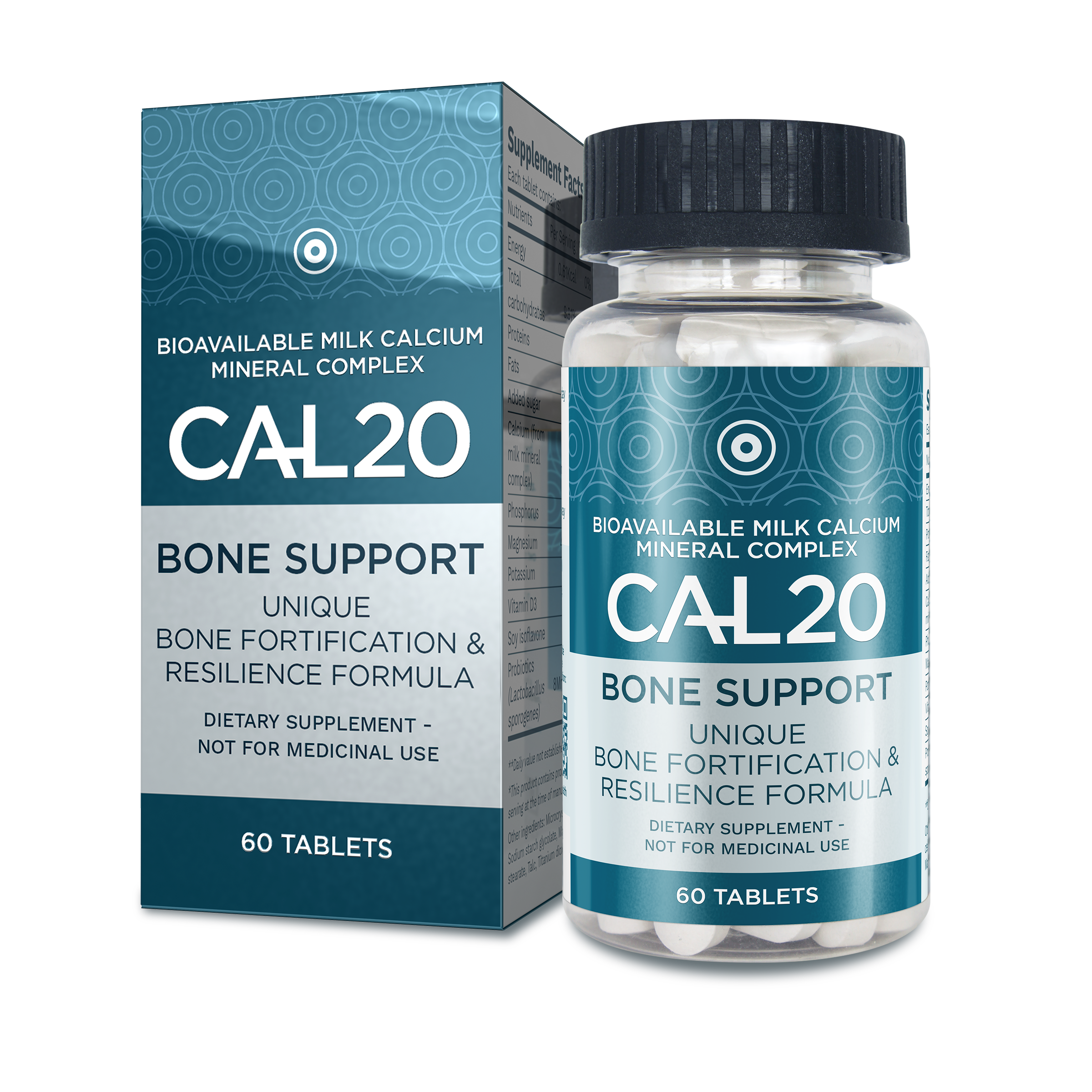Building a Foundation of Health
Strong and healthy bones are crucial for our overall well-being, allowing us to maintain an active and independent lifestyle. Developing strong bones during childhood and adolescence is important, however it is equally vital to undertake measures during adulthood to safeguard bone well-being. In this article we will explore natural solutions to provide a holistic approach to support bone strength and density and delve into several natural strategies and lifestyle choices that can contribute to building and maintaining stronger bones. Let us begin with bone health and why it is important
Bone Health
Our bones are continually changing. New bone is generated while old bone is broken down. During our youth, if we are healthy and eat nutritious food, the body generates new bone at a faster rate than it breaks down old bone, resulting in an increase in bone mass. Typically, individuals reach their peak bone mass around the age of 30. Beyond this age, bone remodelling continues, but the loss of bone mass surpasses the gain.
The susceptibility of developing osteoporosis, a condition characterized by weakened and brittle bones, relies on the amount of bone mass you acquire by the time you reach the age of 30 and how swiftly you lose it thereafter. A higher peak bone mass by age 30 equates to a greater reserve of bone (or bones in the bank) and diminishes the likelihood of developing osteoporosis as you age.
Calcium Levels in The Body
Our bodies need a special mineral called calcium to stay healthy. Calcium is essential for strong bones, teeth and nails. It also plays an important role in blood clotting, helping muscles to contract, regulating normal heart rhythms and nerve functions. It’s important to have the right amount of calcium in our blood. Too much or too little can cause problems.
To make sure we have the right amount of calcium, our body has a clever system in place. It uses two special hormones called parathyroid hormone (PTH) and Calcitonin that are continually balancing the levels of blood calcium.
When our blood calcium levels get too low, our body knows it’s time to add more calcium. The parathyroid glands, which are like tiny sensors located in our neck, release PTH hormone into our blood. This hormone tells our bones to release some of the stored calcium they have. It’s like taking calcium from a calcium “bank” inside our bones and putting it into our blood, where it’s needed.
The PTH hormone will also tell our kidneys to keep more calcium instead of releasing it in our urine. PTH can activate vitamin D to improve the absorption of calcium from the food we eat in the intestines.
On the other hand, if our blood calcium levels get too high, our body needs to lower them. That’s when another hormone called Calcitonin comes into play. It’s produced by a gland called the thyroid gland. Calcitonin tells our bones to hold onto the calcium they have and not release it into the blood. It also helps our kidneys get rid of some extra calcium by sending it out in our urine.
This is why if you are taking a calcium supplement for bone health, you need to take one that is bioavailable, like Cal20. The body absorbs nearly 100% of the milk calcium and minerals in the Cal20 formula but only absorbs about 2% of common calcium like calcium carbonate and calcium citrate because they are mostly extracted from limestone (chalk) and are challenging for the body to break down. The issues around calcium and kidney stones stem from the bioavailability of the type of calcium a person consumes. There have been no side effects, such as constipation or kidney stones, from customers taking Cal20, as has been reported in people taking common calcium (carbonate and citrate).
Factors Affecting Bone Health
- Low calcium intake can lead to reduced bone density, early bone loss, and higher fracture risk. Anyone who follows a vegan, vegetarian and dairy free diet needs to ensure that they are consuming the RDA for calcium. This especially applies to people under the age of 30 because during this period, the strength of your bones is determined for the rest of your life. The stronger your bones are by age 30, the lower your risk of developing osteoporosis.
- Lack of physical activity increases the risk of osteoporosis.
- Tobacco and alcohol use contributes to weak bones and increases the risk of osteoporosis as they impact how the body absorbs calcium and vitamin D.
- Being female, as women generally have less bone tissue than men do and they go through menopause where hormone levels change and increases the risk of osteoporosis.
- A small body frame or extreme thinness, can result in less bone mass and less bone strength to draw on as you age.
- Ageing leads to thinner and weaker bones because the body’s ability to absorb calcium from food decreases as we age.
- Race (white or Asian) and family history of osteoporosis or fractures, increase the risk of developing osteoporosis.
- Hormone imbalances, such as excess thyroid hormone (hyperthyroidism), High levels of parathyroid hormone (primary hyperparathyroidism), low estrogen/testosterone levels and Cushing’s syndrome.
- Eating disorders, underweight conditions, and certain diseases affecting calcium absorption like weight-loss surgery and celiac disease also increase the risk of osteoporosis.
- Certain medications can pose a risk to bone health. Prolonged use of corticosteroids like prednisone, cortisone, prednisolone, and dexamethasone can be detrimental to bones. Additionally, drugs such as aromatase inhibitors for breast cancer, selective serotonin reuptake inhibitors, methotrexate, certain anti-seizure medications like phenytoin (Dilantin) and phenobarbital, and proton pump inhibitors may also increase the likelihood of osteoporosis.
- Other causes include, inflammatory arthritis (especially rheumatoid arthritis), inflammatory bowel disease, coeliac disease, chronic kidney disease and chemotherapy. (See addendum).
How to Best Support Bone Health
Calcium-Rich Diet
A well-balanced diet plays a vital role in promoting bone health, and calcium is an essential nutrient for building strong bones. Incorporating calcium-rich foods such as dairy products, leafy greens, nuts, and seeds can help ensure an adequate intake. Additionally, consuming foods high in vitamin D, such as fatty fish, eggs, and fortified dairy products, is crucial as it aids in calcium absorption. Remember to strive for a varied and nutrient-dense diet to support overall bone health. If you are not able to include such foods in your daily diet, consider supplementing with a revolutionary milk-calcium mineral complex like Cal20 shown to reverse the pain related symptoms of osteoporosis in clinical trials.
Magnesium
Magnesium is important for bone mineralization and is involved in the activation of vitamin D, which aids in calcium absorption. It also plays a role in muscle function and nerve transmission. Good sources of magnesium include dark leafy greens, nuts, seeds, and whole grains. Cal20 also contains magnesium.
Phosphorus
Phosphorus works in conjunction with calcium to form hydroxyapatite crystals, which provide strength and rigidity to bones. It is also involved in energy metabolism and cell signalling. Cal20 also contains phosphorus.
Potassium
Potassium plays multiple vital roles in the body. Firstly, it helps maintain a healthy acid-base balance, which is crucial for bone health and the preservation of bone mass. Additionally, as an electrolyte, potassium contributes to fluid balance by working alongside sodium to regulate water distribution, maintain optimal hydration levels, and prevent dehydration. This essential mineral also supports the proper functioning of cells and tissues, ensuring their optimal performance. Potassium is necessary for proper muscle function, heart function and nerve function. Cal20 also contains potassium.
Sunlight and Vitamin D:
Vitamin D is crucial for bone health because it helps the body absorb calcium from the diet. It promotes calcium deposition in bones and teeth, thereby enhancing bone mineralization. Vitamin D, often referred to as the “sunshine vitamin,” is essential for calcium absorption and utilization thereof, crucial for bone health. Spending time in the sun, especially during midday when the sun’s rays are strongest, allows our bodies to naturally produce vitamin D. However, factors such as location, season and skin colour can affect vitamin D synthesis. Cal20 also contains vitamin D3.
Probiotics
Probiotics are beneficial bacteria that can have a positive impact on various aspects of health, including calcium absorption. There are several reasons why probiotics are believed to support calcium absorption:
1. Enhanced Gut Health: Probiotics help maintain a healthy balance of gut bacteria, which is essential for optimal digestion and nutrient absorption. A healthy gut microbiota creates an environment conducive to efficient calcium absorption.
2. Production of Vitamin K2: Certain probiotic strains can produce vitamin K2, which is involved in calcium metabolism. Vitamin K2 activates proteins that help transport calcium from the bloodstream into the bones, promoting bone mineralization.
3. Short-Chain Fatty Acid Production: Probiotics can ferment dietary fibres in the colon, producing short-chain fatty acids (SCFAs). SCFAs, such as butyrate, help create an acidic environment in the colon, which enhances calcium solubility and absorption.
4. Reduction of Oxalates: Some probiotics have the ability to break down oxalates, which are compounds found in certain foods that can bind to calcium and hinder its absorption. By reducing oxalate levels, probiotics may indirectly improve calcium availability.
5. Regulation of Intestinal pH: Probiotics can help regulate the pH level in the intestine. A slightly acidic environment is optimal for calcium solubility and absorption.
Cal20 is the only calcium supplement that contains probiotics. Standard calcium salt supplements have low absorption rates due to their interaction with phytic acid in food, which hinders calcium absorption. The probiotics in Cal20 prevents the phytic acid from bonding with calcium and thus significantly improves calcium bioavailability compared to traditional calcium salts.
Weight Training and Weight-Bearing Exercises:
Regular physical activity, particularly weight training and /or weight-bearing exercises, is crucial for health as well as maintaining strong bones.
Weight-bearing exercises involve bearing your body weight and include activities like walking, jogging, dancing, and strength training. By subjecting the bones to mechanical stress, these exercises stimulate the formation of new bone tissue, promoting bone density and strength.
Engaging in weight training activities, such as lifting weights, is not only essential for maintaining strong muscles but also strong bones for several reasons:
1. Stimulation of Bone Tissue: Weight training involves applying resistance to your bones through various exercises. This mechanical stress stimulates bone tissue and triggers the process called bone remodelling as discussed earlier.
2. Preventing Bone Loss: Weight-training helps counteract the age-related bone loss by promoting the formation of new bone tissue.
3. Muscle Contractions and Tensions: When you lift weights, your muscles contract and put tension on your bones. This muscle-bone interaction is important because it not only strengthens the muscles but also the bones to handle the forces being exerted on them. Strong muscles help support and protect the bones, reducing the risk of injury.
4. Increased Mineral Content: Studies show weight-training as well as weight bearing exercises increase the retention of important minerals like calcium in our bones.
5. Enhanced Joint Stability: Strong bones contribute to better joint stability. Weight training helps to strengthen the bones around the joints, reducing the risk of joint-related injuries and conditions.
6. Overall Health Benefits: Weight training and other weight-bearing exercises have numerous health benefits, including improved balance, posture, and coordination. They also contribute to better cardiovascular health and muscle tone.
Remember to consult with a healthcare professional before starting any new exercise regimen, especially if you have pre-existing conditions.
Reduce Excessive Alcohol and Caffeine Consumption
While moderate consumption of alcohol and caffeine is generally acceptable, excessive intake can have adverse effects on bone health. Heavy alcohol consumption can interfere with the body’s ability to absorb calcium and impair bone-building cells, leading to decreased bone density. Similarly, high caffeine intake has been associated with decreased calcium absorption and increased calcium excretion. It is best to moderate alcohol and caffeine consumption for the sake of bone health.
How Can Cal20 Help?
Cal20 is a natural supplement that provides numerous health benefits. Understanding its advantages can help individuals make informed decisions about whether they should incorporate it into their daily routine.
Key reasons why taking Cal20 can be beneficial for your overall well-being
1. Enhanced Bone Health: Cal20 contains essential minerals like calcium, phosphorus, potassium and magnesium, which are crucial for maintaining strong and healthy bones. By supplementing with Cal20, you can support optimal bone density, reduce the risk of osteoporosis, and promote skeletal strength as you age.
2. Joint and Muscle Health: The combination of calcium and magnesium in Cal20 provides support for joint and muscle health. These minerals aid in maintaining proper muscle function, reducing muscle cramps, and promoting joint flexibility.
3. Improved Sleep Quality: Cal20 contains magnesium, a mineral known for its calming properties. Magnesium helps regulate neurotransmitters, promoting relaxation and improving sleep quality. By taking Cal20, you can potentially experience better sleep patterns and wake up feeling refreshed. Many of our customers report better sleep when taking Cal20.
4. Optimal Dental Health: Cal20’s calcium content contributes to the health of teeth and gums. Calcium strengthens tooth enamel, reducing the risk of cavities, tooth decay, and gum disease. Incorporating Cal20 into your daily routine can support your healthy smile.
5. Overall Well-being: Cal20 proudly showcases a molecular composition resembling that of a human bone, which enhances its bioavailability. Moreover, its natural blend of Calcium, Phosphorus, and Magnesium in a harmonious ratio of 2:1:0.3 further augments its effectiveness. By providing essential nutrients, Cal20 can help you maintain an active and healthy lifestyle while supporting your body’s natural processes.
It’s important to note that while Cal20 offers potential health benefits, individual results may vary. If you are considering adding Cal20 to your routine or have any specific health concerns, it’s always advisable to consult with a healthcare professional.
Conclusion
Building and maintaining strong bones requires a comprehensive approach that includes proper nutrition, regular exercise, and a healthy lifestyle. By incorporating a calcium-rich diet, focusing on key nutrients like phosphorus, potassium and magnesium, engaging in weight-bearing exercises, optimising vitamin D levels, and limiting alcohol and caffeine intake, we can support our bones naturally. Remember, it’s never too early or too late to prioritise bone health.
Taking care of your health is a lifelong journey and incorporating Cal20 into your daily routine could be a step towards supporting your overall well-being and longevity, so start taking steps today to invest in a stronger and healthier future.
Addendum:
If you or a loved one is battling mesothelioma and concerned about how cancer treatments, including chemotherapy and the medications employed, may impact bone health, Mesothelioma Hope is a valuable knowledge and support resource. Visit their website for in-depth information on this crucial topic.
https://www.mesotheliomahope.com/mesothelioma/
https://www.asbestos.com/mesothelioma/pleural/
_______________________________________________________________________________________
References:
- https://www.osmifw.com/sports-medicine/bone-density-and-weight-bearing-exercise/
- https://orthoinfo.aaos.org/en/staying-healthy/exercise-and-bone-health/
- Cured by Dr Jeff Rediger
- Younger for Longer by Dr Duncan Carmichael (Author)
- Mayo Clinic on Osteoporosis: Keep your bones strong and reduce your risk of fractures by Dr. Ann E. Kearns M.D. Ph.D. (Author)
- The Whole-Body Approach to Osteoporosis: How to Improve Bone Strength and Reduce Your Fracture Risk Paperback – May 1, 2009 by R McCormick DC (Author)
- https://www.jeanhailes.org.au/resources/bone-health-fact-sheet
- https://www.yourhormones.info/endocrine-conditions/osteoporosis/




